The effects of an instructional strategy on grade 11 learners' understanding of genetics
Abstract
Research into learning genetics has largely focused on issues such as problem solving and the process of meiosis. The central concept of genetics, however, has received very little attention despite the fact that it is one of the concepts that learners find difficult (Ogunniyi, 1999; Bahar, Johnstone and Hansell, 1999; Collins and Stewart, 1989). In view of this, the specific purpose of this study was to investigate: (l) concepts of genetics that grade I I learners hold before and after a period of instruction in genetics (2) the differences in the understanding of genetics held by learners exposed to an instructional model and those not so exposed; and (3) possible influences of gender, age, and language on grade I I leamers' understanding of genetics. The method adopted for this study was a multidimensional approach in which both qualitative and quantitative approaches were used to complement each other. The role of the researcher in this study was that of the participant-as-observer. An induction workshop was conducted for both the combined instructional teacher (i.e. experimental teacher) and the traditional instructional teacher (i.e. control teacher) to help them explore and reflect on their practice with the view to create in them an appreciation for multiple teaching strategies or traditional teaching strategies to teaching and learning respectively.

